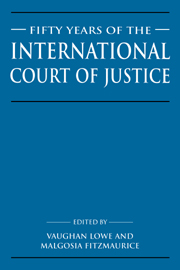Book contents
- Frontmatter
- Contents
- List of contributors
- Preface
- List of abbreviations
- Sir Robert Yewdall Jennings, by Vaughan Lowe
- List of publications of Sir Robert Jennings
- Table of cases
- Part I The International Court of Justice
- Part II The sources and evidences of international law
- Part III Substance of international law
- 10 The Court's role in relation to international organizations
- 11 Cases of the International Court of Justice relating to employment in international organizations
- 12 Jurisdiction and immunities
- 13 Adjudication as a mode of acquisition of territory?
- 14 Equitable maritime boundary delimitation
- 15 Environmental protection and the International Court of Justice
- 16 The contribution of the International Court of Justice to air law
- 17 The treatment of human rights and of aliens in the International Court of Justice
- 18 The International Court of Justice and the right of peoples to self-determination
- 19 The International Court of Justice and the peaceful settlement of disputes
- 20 The International Court of Justice and the use of force
- Part IV Procedural aspects of the work of the International Court of Justice
- Part V The International Court of Justice and the United Nations
- Index
20 - The International Court of Justice and the use of force
Published online by Cambridge University Press: 02 November 2009
- Frontmatter
- Contents
- List of contributors
- Preface
- List of abbreviations
- Sir Robert Yewdall Jennings, by Vaughan Lowe
- List of publications of Sir Robert Jennings
- Table of cases
- Part I The International Court of Justice
- Part II The sources and evidences of international law
- Part III Substance of international law
- 10 The Court's role in relation to international organizations
- 11 Cases of the International Court of Justice relating to employment in international organizations
- 12 Jurisdiction and immunities
- 13 Adjudication as a mode of acquisition of territory?
- 14 Equitable maritime boundary delimitation
- 15 Environmental protection and the International Court of Justice
- 16 The contribution of the International Court of Justice to air law
- 17 The treatment of human rights and of aliens in the International Court of Justice
- 18 The International Court of Justice and the right of peoples to self-determination
- 19 The International Court of Justice and the peaceful settlement of disputes
- 20 The International Court of Justice and the use of force
- Part IV Procedural aspects of the work of the International Court of Justice
- Part V The International Court of Justice and the United Nations
- Index
Summary
Shortly after his election to the International Court, Judge Jennings gave a lecture on the subject of the International Court ofjustice and the use of force in which he argued that the International Court could play an important role in the settlement of disputes involving the use offeree and in the development of that area of international law but rejected as Utopian the idea that the Court could control, or even abolish, war by ruling on all conflicts between states. ‘Only where there is an issue of a justiciable nature, and a recognizable cause or causes of action’ could the Court make a determination. Moreover, Judge Jennings cautioned that even where those requirements were met, the function of the Court should not be seen in isolation but rather as part of the machinery of the United Nations, recognizing that some aspects of a situation involving the use of force might be better dealt with by other parts of that machinery.
At the time that lecture was delivered the only cases in which the Court had been directly confronted with issues of the use of force were the Corfu Channel and Iranian Hostages cases, although a number of other cases involving the use offeree had been commenced but had not proceeded to trial on the merits, while in other cases the Court had made passing comments regarding the law on the use of force had been commenced but had not proceeded to trial on the merits, while in other cases the Court had made passing comments regarding the law on the use of force, such as its remark in the Fisheries Jurisdiction case that ‘under contemporary international law an agreement concluded under the threat or use offeree is void’.
- Type
- Chapter
- Information
- Fifty Years of the International Court of JusticeEssays in Honour of Sir Robert Jennings, pp. 373 - 386Publisher: Cambridge University PressPrint publication year: 1996
- 1
- Cited by

